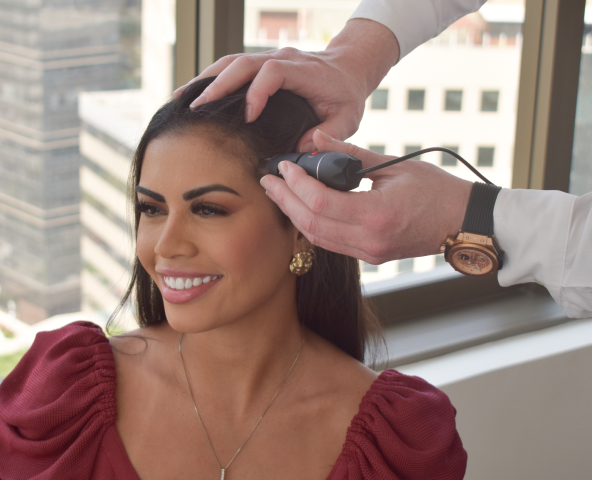CEO & FOUNDER
Surgeon







Yes, all Vinci Hair Clinic consultations are free of charge
The cost of a hair transplant procedure depends greatly on the level of hair loss, the amount of density required, as well as on your expectations. A hair transplant is a permanent procedure and will be visible for the rest of your life. While cost is an important factor, the quality of the work should be your number one priority when choosing a company to undertake your restoration. Various finance options are available to help make the treatment more affordable and therefore achievable.
If you are not a good candidate for a hair transplant procedure, your Vinci specialist will provide you with an honest assessment of your case and recommend alternative treatment options, which may include MSP or medical treatments.
During the consultation, your Vinci specialist will evaluate your stage of hair loss. We will discuss your expectations with you and let you know what we can realistically achieve with the treatment options available to you.
In most cases no. The NHS in the UK for example will pay for a handful of surgeries per year, but rarely in cases of standard pattern baldness. On the other hand, treatment costs for hair loss caused as a direct result of accidents, where private insurance liability is in place, are potentially covered by insurance companies.
The hair around the back and sides of the head is genetically programmed to grow for life. A hair transplant is a simple redistribution of this permanent hair to the thin and balding areas of the scalp.
Hair loss has a range of causes and it is important to get an expert diagnosis in order to choose the right treatment for your specific condition. For example, male pattern baldness is caused by a hormone called DHT (Dihydrotestosterone), which damages the hair follicles on the top of the head, but doesn’t affect the hairs on the back and sides of the head. The same hormone causes female hair loss, but in a different pattern. Other causes of hair loss include stress, scalp conditions and some medications. For personalised hair loss advice, arrange a private consultation with Vinci Hair Clinic.
Absolutely. Your own natural hair is used for the transplant and it will continue growing at the same pace as the rest of your hair.
Vinci FUE sessions will require us to shave your donor area. A longer length can be maintained above and below the shaved area to ensure it remains covered by your own hair length.
As the transplanted hair is in different phases from growth to dormant, regrowth is progressive and starts from approximately three months post-op. At the six month stage, hair growth has been active for three months and we would expect to see a good portion of the hair growing through. Near to all regrowth is achieved from between 12 to 18 months.
Vinci FUE sessions will require us to shave your donor area. A longer length can be maintained above and below the shaved area to ensure it remains covered by your own hair length.
Yes, women can undergo hair transplants to restore thinning areas, lower a high hairline, or improve overall hair density. The same techniques used in male procedures are applied to achieve natural results.
When performed on suitable candidates, female hair transplants can deliver natural-looking, long-lasting results. The success of the procedure depends on the cause and extent of hair loss.
In some cases, it can be effective, particularly when there is stable thinning at the hairline or crown. A consultation will help determine if it’s the most suitable option for your specific type of hair loss.
Yes, transplanted follicles are typically resistant to thinning and should continue to grow for life. However, natural hair loss may still occur in untreated areas.
The cost depends on the number of grafts required and the complexity of the procedure. A personalised quote will be provided following an assessment.
Many women opt for hairstyles, scarves, or headbands to cover the treated area during the healing process. Most visible signs of the procedure fade within one to two weeks.

The hair around the back and sides of the head is genetically programmed to grow for life. A hair transplant is a simple redistribution of this permanent hair to the thin and balding areas of the scalp.
Hair loss has a range of causes and it is important to get an expert diagnosis in order to choose the right treatment for your specific condition. For example, male pattern baldness is caused by a hormone called DHT (Dihydrotestosterone), which damages the hair follicles on the top of the head, but doesn’t affect the hairs on the back and sides of the head. The same hormone causes female hair loss, but in a different pattern. Other causes of hair loss include stress, scalp conditions and some medications. For personalised hair loss advice, arrange a private consultation with Vinci Hair Clinic.
Absolutely. Your own natural hair is used for the transplant and it will continue growing at the same pace as the rest of your hair.
Vinci FUE sessions will require us to shave your donor area. A longer length can be maintained above and below the shaved area to ensure it remains covered by your own hair length.
As the transplanted hair is in different phases from growth to dormant, regrowth is progressive and starts from approximately three months post-op. At the six month stage, hair growth has been active for three months and we would expect to see a good portion of the hair growing through. Near to all regrowth is achieved from between 12 to 18 months.
Yes. The hair follicles we transplant from the donor area are genetically programmed to grow for the rest of your life. These genetic properties do not change when the hair is moved to the bald and thinning area.
Yes, women can undergo hair transplants to restore thinning areas, lower a high hairline, or improve overall hair density. The same techniques used in male procedures are applied to achieve natural results.
When performed on suitable candidates, female hair transplants can deliver natural-looking, long-lasting results. The success of the procedure depends on the cause and extent of hair loss.
In some cases, it can be effective, particularly when there is stable thinning at the hairline or crown. A consultation will help determine if it’s the most suitable option for your specific type of hair loss.
Yes, transplanted follicles are typically resistant to thinning and should continue to grow for life. However, natural hair loss may still occur in untreated areas.
The cost depends on the number of grafts required and the complexity of the procedure. A personalised quote will be provided following an assessment.
Many women opt for hairstyles, scarves, or headbands to cover the treated area during the healing process. Most visible signs of the procedure fade within one to two weeks.
Yes, all Vinci Hair Clinic consultations are free of charge
The cost of a hair transplant procedure depends greatly on the level of hair loss, the amount of density required, as well as on your expectations. A hair transplant is a permanent procedure and will be visible for the rest of your life. While cost is an important factor, the quality of the work should be your number one priority when choosing a company to undertake your restoration. Various finance options are available to help make the treatment more affordable and therefore achievable.
If you are not a good candidate for a hair transplant procedure, your Vinci specialist will provide you with an honest assessment of your case and recommend alternative treatment options, which may include MSP or medical treatments.
During the consultation, your Vinci specialist will evaluate your stage of hair loss. We will discuss your expectations with you and let you know what we can realistically achieve with the treatment options available to you.
In most cases no. The NHS in the UK for example will pay for a handful of surgeries per year, but rarely in cases of standard pattern baldness. On the other hand, treatment costs for hair loss caused as a direct result of accidents, where private insurance liability is in place, are potentially covered by insurance companies.